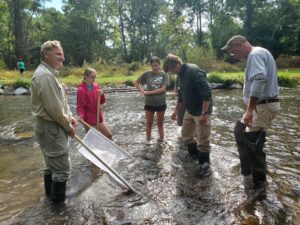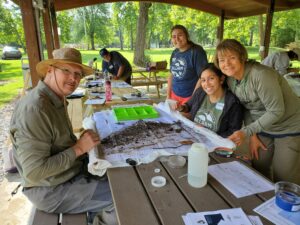After a period of virtual-only macroinvertebrate identification support, ALLARMies and volunteers were finally reunited for the first in-person macroinvertebrate workshop since before the pandemic! On September 10, 2022, Director Julie Vastine, Community Science Specialist Stephanie Letourneau, and Watershed Coordinators – Grace Messimer ‘23, Michelle Cao ‘25, Amaya Hamilton ‘24, and Natalia Uro-De Leon ‘24 trained volunteer monitors from Cumberland and Lebanon counties on macroinvertebrate collection and identification.
Amaya: We had a lot of prep work in the week leading up to the workshop. The watershed coordinators spent time online looking at macroinvertebrates, learning how to distinguish one order from another, and putting this knowledge into practice identifying preserved specimens. We worked through the macroinvertebrate manual thoroughly to ensure that our own understanding would allow us to confidently teach the content to the volunteers.
This workshop was an incredible experience for me because I got to meet so many people from different backgrounds and with different experience levels with macroinvertebrate identification. Working collaboratively with volunteers both allowed me to learn others’ techniques in macroinvertebrate identification as well as solidifying my own techniques by teaching them to others. Although I am still new at ALLARM, I feel as though this workshop helped me gain a lot of certainty in my understanding of the macroinvertebrate procedure.
My favorite moment of the workshop was picking the macroinvertebrates out of our nets. The group I helped lead through the procedure was so focused, huddled together over the net, looking for any sign of movement. At that time, I thought how nice it was to be part of an event like this, where people travel from their home counties and come together in a collaborative effort to learn how to monitor their local streams and rivers. Although many of us had never met each other, we all got along and worked together diligently towards our common goal of learning the best monitoring practices.
Natalia: In preparation for this event, I was diligent about studying key characteristics of macroinvertebrates so I would be able to distinguish between small differences in the field. During the workshop, I encouraged my team to pull macroinvertebrates from our net for closer inspection under our microscopes. I guided them through identification by prompting them with questions about what features they observed, encouraging them to follow the dichotomous key. By supporting volunteers as they strengthened their skills, I observed their excitement and confidence flourish which was beyond rewarding.
One of my favorite aspects of these in-person workshops is the engagement with our volunteers. As we waited for everyone to sign in, I had the opportunity to make conversation with two volunteers who were experienced fly-fishermen. In our conversations, I learned how their love of fly-fishing intertwines with their strong sense of environmental stewardship. Their dedication to maintaining the health of local waterways by participating in community-based science efforts was truly inspirational.
Overall, this event was a great experience for new and seasoned ALLARMies! We were able to hone our skills in the field while introducing ourselves to the fabulous network of Stream Team volunteers.

